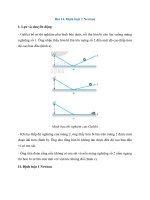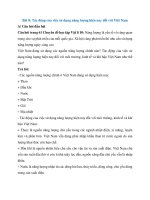GENDER TROUBLE 11
Bạn đang xem bản rút gọn của tài liệu. Xem và tải ngay bản đầy đủ của tài liệu tại đây (20.42 KB, 1 trang )
Gender Trouble
Gender Trouble is rooted in “French Theory,” which is itself a curious
American construction. Only in the United States are so many disparate
theories joined together as if they formed some kind of unity. Although
the book has been translated into several languages and has had an especially strong impact on discussions of gender and politics in Germany, it
will emerge in France, if it finally does, much later than in other countries. I mention this to underscore that the apparent Francocentrism of
the text is at a significant distance from France and from the life of theory in France. Gender Trouble tends to read together, in a syncretic vein,
various French intellectuals (Lévi-Strauss, Foucault, Lacan, Kristeva,
Wittig) who had few alliances with one another and whose readers in
France rarely, if ever, read one another. Indeed, the intellectual promiscuity of the text marks it precisely as American and makes it foreign to a
French context. So does its emphasis on the Anglo-American sociological and anthropological tradition of “gender” studies, which is distinct
from the discourse of “sexual difference” derived from structuralist
inquiry. If the text runs the risk of Eurocentrism in the U.S., it has
threatened an “Americanization” of theory in France for those few
French publishers who have considered it.1
Of course, “French Theory” is not the only language of this text. It
emerges from a long engagement with feminist theory, with the debates
on the socially constructed character of gender, with psychoanalysis and
feminism, with Gayle Rubin’s extraordinary work on gender, sexuality,
and kinship, Esther Newton’s groundbreaking work on drag, Monique
Wittig’s brilliant theoretical and fictional writings, and with gay and
lesbian perspectives in the humanities. Whereas many feminists in the
1980s assumed that lesbianism meets feminism in lesbian-feminism,
Gender Trouble sought to refuse the notion that lesbian practice instantiates feminist theory, and set up a more troubled relation between the
two terms. Lesbianism in this text does not represent a return to what
is most important about being a woman; it does not consecrate femininity or signal a gynocentric world. Lesbianism is not the erotic con-
x


